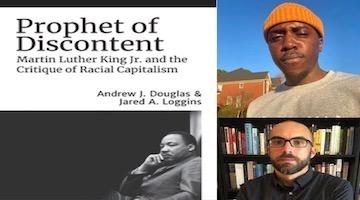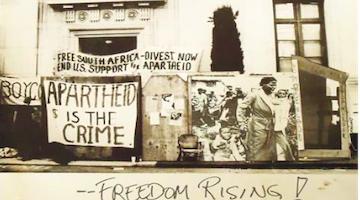Related Stories
Keeanga-Yamahia Taylor
Historian Elizabeth Hinton’s book reveals that, in the late sixties and early seventies, there were hundreds of local rebellions against white viol
joshua briond
The response to Black rebellion are all distinct types of “reforms” to politically sedate Black surplus populations and sustain white settler-capit
Roberto Sirvent, BAR Book Forum Editor
Jazzman William Parker’s work is a bold art of resistance to capitalism, colonialism, racism, and the runaway train that is our present-day America
Joy James
Joy James uses poet Lucille Clifton's image of “new bones” to reflect on a series of revolutionary anniversaries in 2021 and the nature of pol
Roberto Sirvent, BAR Book Forum Editor
The authors set out to reconstruct King’s critical theory of racial capitalism.
George Yancy
White supremacist culture is a permanent site of predatory consumption, extraction and violation.
Editors, The Black Agenda Review
By what stretch of the imagination can the US be a democracy when ordinary citizens have virtually no influence over what their government does?&…
Charisse Burden-Stelly, PhD
The celebration of Isabel Wilkerson’s Caste reflects the continued priority of elite preferences over the needs and struggles of
Gustavus Griffin
A significant portion of sports franchise wealth can be traced directly to the oppression and displacement of Black and Brown bodies.
Editors, The Black Agenda Review
The phrase racial capitalism first emerged in the context of the anti-Apartheid and southern African liberation struggles in the 1970s.
More Stories
- Black Agenda Radio with Margaret KimberleyOur guest is Rosa Clemente, who is an activist, independent journalist, and currently a Doctoral student in the W.E.B. Du Bois Department of Afro-American Studies, UMASS-Amherst. She was the Green…
- Black Agenda Radio with Margaret KimberleyA new anthology, From the Flag to the Cross: Fascism American Style, was recently published by OR Books. We're joined by co-editor Michael Steven Smith, a retired attorney, former board member of the…
- Margaret Kimberley, BAR Executive Editor and Senior ColumnistThe power structure in the U.S. can be boiled down to a system of might, and white, making right. Donald Trump has exposed its rotten foundations and the two-faced collaborators who keep it running.
- Editors, The Black Agenda Review“There has been divide and rule in the modern Caribbean with a vengeance, all in the interest of US hegemony over the economic, military and political destiny of the Caribbean as a whole.”
- Ann Garrison, BAR Contributing EditorThese are remarks prepared for a 09/16/25 Covert Action webinar on Neocolonialism in Africa.



















